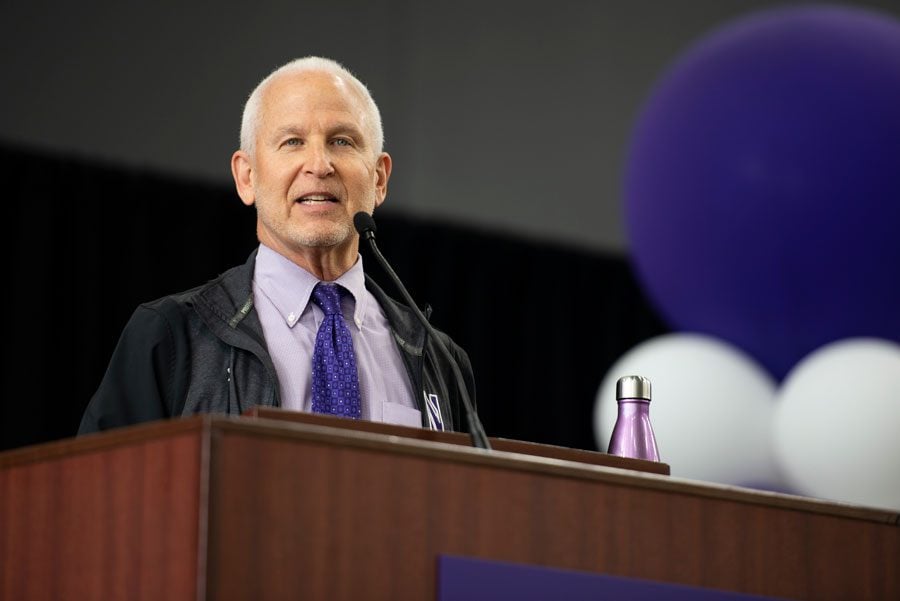President Schapiro co-bylines op-ed on the threat of academic espionage
Daily file photo by Evan-Robinson Johnson
University President Morton Schapiro addresses the class of 2023 and transfers.
September 23, 2019
American colleges, universities and federal policymakers should work hand in hand to combat the threat of academic espionage, Northwestern president Morton Schapiro and Indiana University President Michael A. McRobbie wrote in a recent op-ed for The Hill.
In the piece, Schapiro and McRobbie — the acting chair of the Association of American Universities board of directors — dispute the “current drumbeat” of concern voiced by the intelligence community that foreign actors are exploiting the ideals of collaboration and academic freedom on American campuses to steal, attack or sabotage U.S. research and technological advances.
“This erroneous narrative holds that colleges and universities have failed to take these concerns seriously,” they wrote. “This is far from the truth.”
University-sponsored research is considered a critical pillar of Northwestern’s reputation — among other factors, the university’s climb from 10th to ninth place in the U.S. News and World Report rankings has been largely attributed to its record $797.8 million in sponsored research funding. In a statement to The Daily, Schapiro said he co-authored the piece because of how important the issue of addressing foreign threats is to American research universities.
International students, researchers and faculty — those most likely to be pinpointed as threats in this case — were also a continuously emphasized attribute of Northwestern’s campuses in the op-ed.
Despite highlighting AAU recommendations to “underscore for faculty how systematic programs of foreign influence can jeopardize core scientific and academic values of our institutions and the integrity of our research,” Schapiro and McRobbie argued it would be a “significant strategic mistake” for U.S. policymakers to question the recruitment of international students and academics to American schools or consider denying them entry altogether.
“Closing our campuses to foreign visitors, ignoring the major contributions our international students and scholars make to the advancement of American science and abandoning the very openness that has been a central ingredient to the success of American innovation would ultimately do more harm to the U.S. research enterprise than good,” they wrote. “It would also send a horrible signal to the rest of the world.”
The presidents wrote that colleges and universities like theirs have been aggressively engaged in addressing threats of foreign interference, noting AAU-backed policies such as conducting an inventory of campus activities involving security matters and ensuring that faculty, staff and students are meeting all existing federal disclosure and export controls compliance requirements.
However, Schapiro and McRobbie acknowledged that institutions of higher learning may not be best positioned to fully secure the nation and its intellectual property. Within that vein, they voiced support for the “Securing American Science and Technology Act,” a piece of legislation introduced by Rep. Mikie Sherrill (D-N.J.) and Rep. Anthony Gonzalez (R-Ohio).
The act would establish an interagency working group that ensures that security controls are properly employed to protect national security while maintaining the free flow of fundamental scientific information, facilitating dialogue between academic and federal actors.
“Colleges and universities should continue to play their part by strengthening their protocols,” they wrote. “Federal policymakers should base any new laws or rules on what is actually happening on our college campuses rather than on a narrative that is not based in reality.”
It is not uncommon for Schapiro to use national news as a platform to voice his political convictions. In April, he co-penned a Washington Post op-ed where he claimed a “recommitment to prudence” is necessary to gain headway on issues such as climate change and minimum wage, and in June 2016 he authored a piece in The Post vocalizing support of safe spaces on college campuses.
Email: [email protected]
Twitter: @daisy_conant












